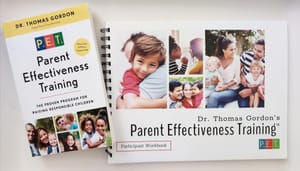When parents use power (reward or punishment) to resolve conflicts in their relationship with their children, the child will develop other behaviors (“coping mechanisms”) in response to the use of power by the parent. These behaviors might include:
- Resistance, defiance, rebellion, or a negative outlook.
- Resentment, anger, and hostility.
- Aggression, retaliation, striking back.
- Lying, hiding feelings.
- Blaming others, tattling, cheating.
- Dominating, bossying, bullying.
- Needing to win, hating to lose.
- Forming alliances, organizing against parents.
- Submission, obedience, compliance.
- Apple-polishing, courting favor.
- Conformity, lack of creativity, fear of trying something new,requiring prior assurance of success.
- Withdrawing, escaping, fantasizing, regression.
It’s possible to learn nonpower methods of conflict resolution that do not give up the needs of the parent but are also responsive to the needs of the child. In the Parent Effectiveness Training course, we call this the No-Lose Method, or Method III. In Method III, the parent does not use reward or punishment to get their needs met at the expense of the child, and the child does not get their needs met at the expense of the parent. When the use of parental power is removed from the equation, children do not need coping behaviors, because their needs — as well as the parent’s needs — are both being met.
In addition to the method of conflict resolution used and the parent’s attitudes toward power, the quality of communication between the parent and child forms the basis of the relationship, and therefore has the greatest impact on the child’s behavior.
When parents learn communication skills that allow them to listen to their children as a “helping agent” when the child owns a problem, they keep the door open for information to flow freely and accurately between the child and the parent, and communicate acceptance and empathy to the child. This has a big effect on the child’s self-esteem, and creates a sense of trust in the parent-child relationship. Parents can further learn and apply skills to confront unacceptable behavior in a way that doesn’t damage the child’s self-esteem yet sets a clear limit on what the parent is willing to accept. In general, the way parents speak to their children and the way parents resolve conflicts with their children have the greatest effect on children’s behavior.




Member discussion